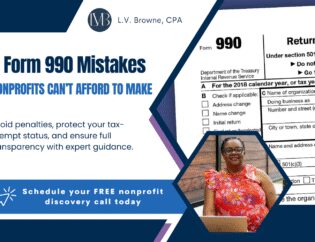Maximize Your Creative Finances
As a content creator, managing your finances effectively is crucial for the success and sustainability of your business. In this blog post, we’ll explore six crucial tax tips tailored specifically for content creators, helping you navigate the financial landscape of your creative endeavors.
Key Takeaways:
- Separate Personal and Business Finances
- Remember Self-Employment Taxes
- Track your Deductible Expenses
- Plan for Estimated Taxes
- Ensure Your Business is Legitimate
- Seek professional advice
Separate Personal and Business Finances
The separation of your personal and business finances is essential. It will provides clarity when tracking income and expenses related to your business, and will protect your own assets and credit. For example, creating a dedicated business checking account for receiving payments from sponsorships, ad revenue, and other business-related income.
Remember Self-Employment Taxes
As a content creator, it’s important to keep in mind that you’re responsible for self-employment taxes. This tax includes Social Security and Medicare contributions and applies to individuals who work for themselves. The self-employment tax rate is 15.3%, comprising 12.4% for Social Security (old-age, survivors, and disability insurance) and 2.9% for Medicare (hospital insurance).
Track Your Deductible Expenses
As a content creator or influencer, you have a distinct advantage when it comes to tax write-offs. Numerous expenses directly associated with your content creation and promotion can be deducted from your taxable income, potentially leading to significant savings. From advertising fees to editing software, there’s a wide array of deductions available to help lower your tax bill.
-
- Advertising fees
-
- Brand merchandise costs
-
- Business meals
-
- Home office expenses
-
- Travel expenses
By diligently documenting these expenses and seeking professional tax assistance if necessary, you will be well-equipped to accurately report them on Schedule C (Form 1040) when it’s time to file your taxes. Maximize your deductions, minimize your tax liability, and keep your finances in order as you continue to create engaging content!
Plan for Estimated Taxes
Content creators are typically responsible for paying estimated taxes quarterly, as taxes aren’t withheld from their earnings. Calculate your estimated tax liability based on projected annual income and make timely quarterly payments to the IRS. Monitoring income and expenses throughout the year helps accurately estimate tax obligations and avoid penalties and interest for underpayment. For instance, if you anticipate a significant increase in income, adjust your estimated tax payments accordingly to avoid surprises at tax time.
Ensure Your Business is Legitimate
Generally, an activity qualifies as a business if it is carried on with the reasonable expectation of earning a profit. The IRS won’t recognize your business as legitimate unless you have made a profit in at least three of the most recent five tax years. Other considerations are whether you depend on the business income and the time spent running it.
This is important because if the IRS categorizes your business as a hobby, they won’t allow your expense deductions.
Seek Professional Advice
Seeking professional advice from accountants or financial advisors can provide valuable insights and ensure compliance with tax laws. An experienced professional, Lakeesha V. Browne, CPA can offer personalized guidance tailored to your unique financial situation, helping you optimize tax strategies, maximize deductions, and navigate complex financial matters effectively.
Contact us today to set up a consultation and learn more about our services at L.V. Browne, CPA.











